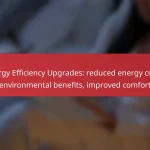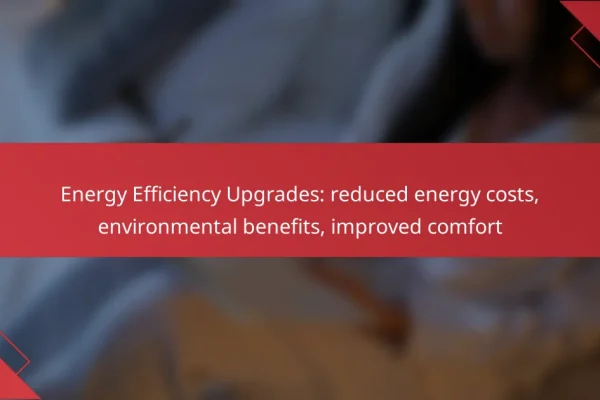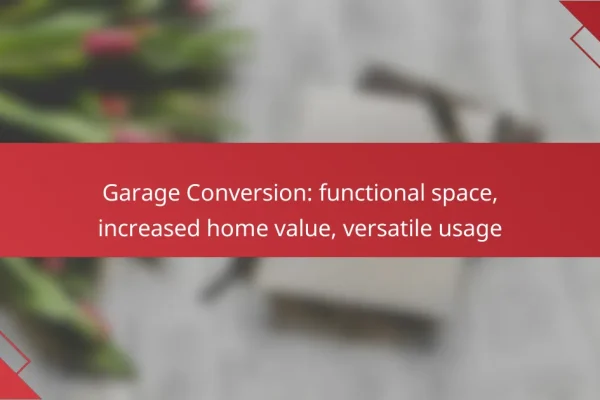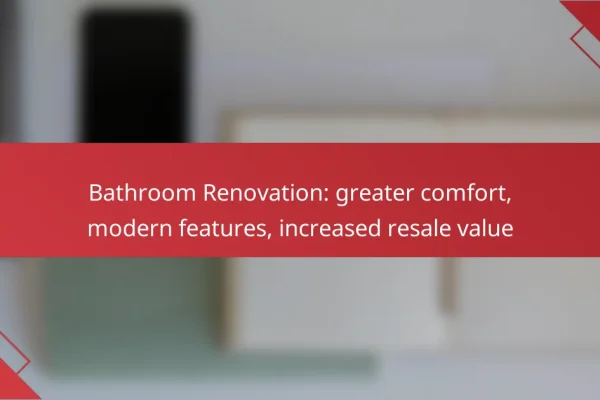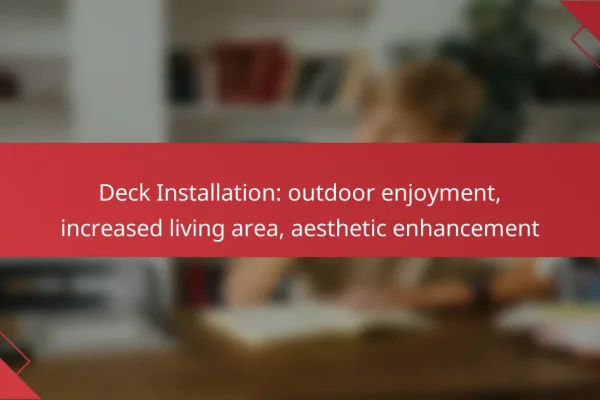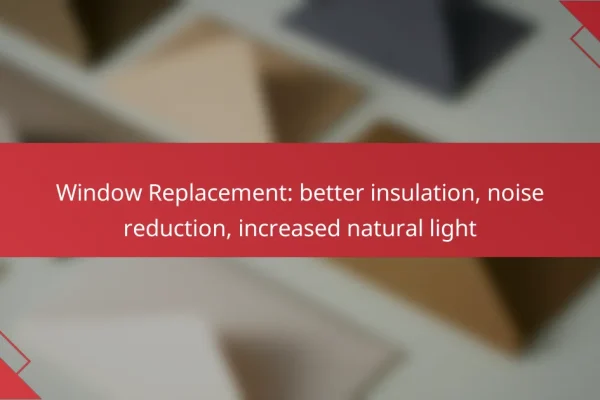What are the benefits of successful home improvements in the UK?
Successful home improvements in the UK can lead to significant benefits, including increased property value, enhanced energy efficiency, and improved living conditions. These upgrades not only make a home more enjoyable but also provide long-term financial advantages.
Increased property value
One of the primary benefits of successful home improvements is the potential for increased property value. Renovations such as kitchen upgrades, bathroom remodels, and adding extra living space can significantly boost a home’s market price.
According to various property experts, well-planned improvements can yield returns of 70% to 100% or more on investment. Homeowners should focus on projects that appeal to potential buyers in their area to maximize value.
Enhanced energy efficiency
Improving a home’s energy efficiency is another key benefit of successful renovations. Upgrades like double glazing, insulation, and energy-efficient appliances can reduce energy consumption and lower utility bills.
In the UK, homeowners can benefit from government schemes that provide financial incentives for energy-efficient upgrades. These improvements not only save money but also contribute to a more sustainable environment.
Improved aesthetic appeal
Successful home improvements can greatly enhance a property’s aesthetic appeal. Fresh paint, modern fixtures, and landscaping can transform a home’s appearance, making it more inviting and visually pleasing.
Investing in curb appeal is particularly important, as first impressions can influence potential buyers. Simple changes like updating the front door or adding outdoor lighting can make a significant difference.
Better functionality
Home improvements often lead to better functionality, making spaces more usable and efficient. For example, creating an open-plan layout can enhance flow and accessibility in a home.
Consideration of lifestyle needs is crucial; adding storage solutions or redesigning spaces for specific activities can greatly improve daily living. Homeowners should assess their current layout and identify areas for enhancement.
Increased comfort
Successful home improvements can significantly increase comfort levels within a home. Upgrades such as better heating systems, air conditioning, and soundproofing can create a more pleasant living environment.
Investing in high-quality materials and finishes can also enhance comfort. Homeowners should prioritize features that cater to their personal comfort preferences, ensuring a cozy and inviting atmosphere.
How do home improvements impact energy efficiency?
Home improvements can significantly enhance energy efficiency by reducing energy consumption and lowering utility bills. Upgrades such as better insulation, energy-efficient windows, and smart home technology can lead to substantial savings and a more comfortable living environment.
Insulation upgrades
Upgrading insulation is one of the most effective ways to improve energy efficiency. Proper insulation minimizes heat loss in winter and keeps homes cooler in summer, leading to reduced reliance on heating and cooling systems. Consider using materials that meet local building codes and energy standards.
Common insulation materials include fiberglass, foam board, and spray foam, each with varying R-values, which measure thermal resistance. Homeowners should aim for an R-value that suits their climate; for instance, colder regions may require higher R-values for optimal performance.
Energy-efficient windows
Energy-efficient windows can dramatically reduce heating and cooling costs by minimizing air leakage and improving thermal performance. Look for windows with a low U-factor, which indicates better insulation, and those that have a high Solar Heat Gain Coefficient (SHGC) for warmer climates.
Double or triple-pane windows filled with argon gas offer better insulation than single-pane options. Additionally, consider window films or low-emissivity (Low-E) coatings to further enhance energy efficiency without compromising natural light.
Smart home technology
Smart home technology can optimize energy use by allowing homeowners to control heating, cooling, and lighting remotely. Devices like smart thermostats learn user habits and adjust settings automatically, leading to energy savings of around 10-15% on heating and cooling bills.
Integrating smart lighting systems can also reduce energy consumption by using sensors to turn off lights when rooms are unoccupied. When selecting smart devices, ensure compatibility with existing systems and look for Energy Star-rated products for maximum efficiency.
What are the most popular home improvement projects in the UK?
The most popular home improvement projects in the UK include kitchen renovations, bathroom upgrades, garden landscaping, and loft conversions. These projects not only enhance the aesthetic appeal of a home but can also significantly increase its market value.
Kitchen renovations
Kitchen renovations are among the top choices for homeowners looking to improve their living space. A modern kitchen can include updated appliances, new cabinetry, and improved layouts to enhance functionality. Homeowners often spend between £5,000 and £30,000 depending on the scope of the renovation.
When planning a kitchen renovation, consider the flow of the space and how it interacts with other areas of the home. It’s crucial to choose durable materials that can withstand daily use while also reflecting your personal style.
Bathroom upgrades
Bathroom upgrades can transform a dated space into a relaxing retreat. Common improvements include installing new fixtures, upgrading tiles, and enhancing lighting. Costs typically range from £3,000 to £15,000 based on the extent of the renovations.
Focus on maximizing space and functionality, especially in smaller bathrooms. Features like walk-in showers or double sinks can significantly improve usability, while energy-efficient fixtures can reduce long-term utility costs.
Garden landscaping
Garden landscaping is a popular way to enhance outdoor spaces, providing both aesthetic appeal and increased property value. Projects can vary from simple lawn care to elaborate designs featuring patios, pathways, and planting schemes. Budgeting for landscaping can range from a few hundred to several thousand pounds, depending on the complexity.
Consider local climate and soil conditions when planning your garden. Choosing native plants can reduce maintenance and water usage, while well-designed outdoor areas can create inviting spaces for relaxation and entertainment.
Loft conversions
Loft conversions are an effective way to add living space without extending the footprint of your home. This project typically involves transforming an unused attic into a functional room, such as a bedroom or office. Costs for loft conversions can range from £20,000 to £50,000, influenced by the size and complexity of the project.
Before starting a loft conversion, check local building regulations and consider the structural integrity of your home. Proper insulation and ventilation are essential to ensure the new space is comfortable year-round.
What factors should be considered before starting home improvements?
Before starting home improvements, it’s essential to evaluate several key factors that can significantly impact the project’s success. These include budget constraints, local regulations, property type, and current market trends.
Budget constraints
Establishing a budget is crucial for any home improvement project. Determine how much you can afford to spend, considering both materials and labor costs. It’s wise to allocate an additional 10-20% of your budget for unexpected expenses that may arise during the renovation.
When setting your budget, prioritize essential upgrades over cosmetic changes. For example, investing in energy-efficient windows may yield long-term savings, while new paint might be less critical.
Local regulations
Understanding local regulations is vital before commencing any home improvements. Many areas require permits for structural changes, electrical work, or plumbing modifications. Failing to obtain the necessary permits can lead to fines or the need to undo completed work.
Check with your local building department to learn about specific codes and regulations that apply to your project. This will help ensure compliance and avoid potential legal issues down the line.
Property type
The type of property you own can influence the scope and style of home improvements. For instance, historical homes may have restrictions on renovations to preserve their character, while modern homes may allow for more flexibility in design.
Consider the unique features of your property when planning improvements. Tailoring your upgrades to complement the existing architecture can enhance both functionality and aesthetic appeal.
Market trends
Staying informed about current market trends can guide your home improvement decisions. Popular upgrades, such as open floor plans or smart home technology, can increase your property’s value and appeal to potential buyers.
Research local real estate listings to identify features that are in demand. This knowledge can help you make strategic improvements that not only enhance your living space but also provide a good return on investment when selling your home.
How can homeowners finance their home improvement projects?
Homeowners can finance their home improvement projects through various methods, including loans, credit lines, and savings. Choosing the right financing option depends on factors like project cost, personal financial situation, and interest rates.
Home equity loans
Home equity loans allow homeowners to borrow against the equity they have built in their property. Typically, these loans offer fixed interest rates and are repaid over a set term, making them a predictable financing option.
When considering a home equity loan, it’s essential to assess your home’s current value and the outstanding mortgage balance. Generally, lenders allow you to borrow up to 80-90% of your home’s equity. For example, if your home is valued at $300,000 and you owe $200,000, you might access $80,000 to $90,000.
Be cautious of the potential risks, such as the possibility of foreclosure if you fail to repay the loan. It’s advisable to compare offers from multiple lenders and understand the terms before proceeding.




